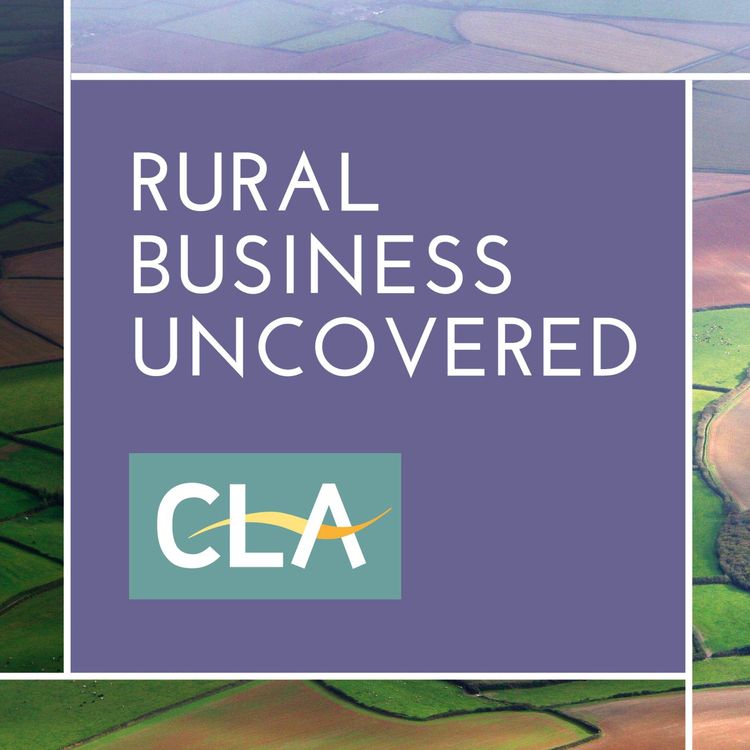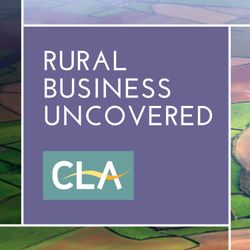Share

CLA Rural Business Uncovered
Impact of drought: Water management and dry weather
We discuss the impact of the drought this year and the importance of water management going into 2023.
Last summer was the joint warmest for England and was notable for the extreme heat of 18-19 July where temperatures reached excess of 40C for the first time, breaking the previous all-time temperature record. With pressures on water resources from climate change and a growing population, matching water supply and demand is increasingly challenging and represents a real risk to society and the environment.
What will you hear?
Alice Green, Policy Adviser on Climate and Water, explains the impacts we have seen from the dry summer, the wider pressures on water resources, and what the Government can do to support the sector.
Steve Moncaster, BAWAG Membership and Technical Advisor, discusses the outlook for farm businesses to 2023 if dry weather continues over this winter, how abstraction licencing will reform influence the situation, and how we could have better planned for the drought.
We are also joined by Anthony Seaman, arable farmer in North Norfolk, who shares with us how the drought has affected his farm, the steps he is taking on his farm in response to the drought, and how farmers can build water resilience against hot weather.
More episodes
View all episodes

1. CLA Veteran's Initiative
22:25||Season 5, Ep. 1What is a veteran?The CLA and the Armed Forces Covenant – our three pledgesThe unique skills sets of veteransRural employers working with the veterans communityThe Veteran Rural Skills PartnershipHow CLA members can help
9. How to nurture and develop the local food economy
33:59||Season 4, Ep. 9Developing local food networks and strengthening support for locally sourced food has a multitude of benefits. Buying locally sourced food reduces food miles meaning less fuel is used in transportation, reducing its carbon footprint, it supports nearby businesses, creates local employment, keeps money circulating within the local economy and much more. Judicaelle Hammond, CLA Director of Policy and Advice, talks us through what a local food chain is, whether consumers understand it in the same way, and what is needed to make the Government Food Strategy’s consultation on a plan for 50% of food expenditure in the public sector to go on food produced locally or to higher environmental standards work. Vicki Hird, Head of Sustainable Farming at Sustain, explains the key actions needed to increase interest in local food, how local food chains can be sustained alongside retailers, and how they can remain financially viable. Karl Avison, founder of Cedar barn Farm Shop and Café, shares with us the measures he has taken in his own business to inform consumers about the benefits of buying local, and the role of local food supply chains in the rural economy.
8. Biodiversity net gain in the planning system: Updated regulation and policy
22:42||Season 4, Ep. 8We delve into what the new biodiversity net gain regulations mean for land managers and rural businesses wanting to submit planning applications. The introduction of mandatory biodiversity net gain in the planning system by the Environment Act 2021 is expected in 2023, following consultation, publication, and implementation of regulations. The new policy will require, as a condition of planning permission, that any new development demonstrate a net gain of a minimum 10% of the biodiversity value on the site, measured using Defra's Biodiversity Metric. What will you hear?Fenella Collins, CLA Head of Planning, covers what biodiversity net gain is, why it's so important, and how it can be achieved as well as how biodiversity net gain interfaces with the planning system and national planning policy. You will also hear about the legal mechanisms for delivering biodiversity net gain, the role of the Local Nature Recovery Strategies, and the Biodiversity Metric.
7. Measuring farming sustainability: science, practice and policy
38:20||Season 4, Ep. 7This podcast covers the ins and outs of what farming sustainability means and how it can be measured. Defra recently launched their Sustainable Farming Incentive, and the Welsh Government are in the process of developing their Sustainable Farming Scheme. In many respects, sustainable farming has come to equate with reduced impact on the environment, whether that is climate, air, water or soils. Consumers and the supply chains are placing greater demands on farming businesses to be more environmentally responsible and there is the ever-present threat of increased regulation if incentivises don’t work. What will you hear?Susan Twining, CLA Chief Land Use Policy Adviser, explains how sustainable farming fits within policy thinking, how to measure sustainability, and the role of the Government to build confidence in setting clear guidance on how to measure and assess what these sustainability metrics are. John Renner, Farmer at Bellshill Farm, talks us through what sustainable farming means, the practices implemented on his farm, and how he deals with environmental conflicts. Hugh Martineau, Head of Sustainability at Map of Ag, discusses how you can improve profits through sustainable farming, where you can get advice and support on data gathering, how to make sense of the data and how to use it to improve your business.
5. Discover the opportunities of agroforestry
32:06||Season 4, Ep. 5This episode explores the potential and opportunities of making agroforestry central to land management plans. Net zero targets and the need to mitigate climate change is driving strong interest from the Government in tree planting because of their ability to sequester carbon. We hear a lot about woodland creation targets, but agroforestry can play a role too. Graham Clark, CLA Senior Land Use Policy Adviser, gives an introduction into agroforestry, and explains the Government policy and incentives in place for landowners, and how to know whether taking up agroforestry is right for you. John Pawsey, a landowner and organic farmer at Shimpling Park Farms, shares with us the agroforestry system on his farm, the benefits and practical considerations, and the key things to consider for anyone looking into agroforestry.
4. Mental health and wellbeing in the rural industry: How can we combat the challenges?
28:34||Season 4, Ep. 4Mental health includes our emotional, psychological, and social well-being. Farming and other agricultural related professions are known to face particular mental health challenges, with higher than average rates of depression and suicide. According to the Farm Safety Foundation, 81% of farmers under 40 believe that mental health is the biggest hidden problem facing farmers today and 92% believe that promoting good mental health is crucial if lives are to be saved and farmers kept safe. This episode explores the mental health challenges that are faced within the agricultural industry across different groups and what support can be provided to combat them. What will you hear?Hazel Craig, Senior Data Analytics and Wellbeing Consultant at CLA Healthcare, discusses the current circumstances of mental health within the rural industry, the pressures that contribute towards poor mental health and why those in rural areas are more susceptible.Leo Savage, Global Wellbeing Consultant at CLA Healthcare, shares with us how widespread poor mental health in the farming community is, how you can support your colleagues and employees, and the resources that are available through CLA Healthcare and other organisations and charities. If you, or someone you know, is worried about your mental health please contact Samaritans. To contact CLA Healthcare for any further information please call 01274 717361 or email healthcare@cla.org.uk.
3. Land promotion explained: Are you considering selling your land for commercial development?
18:07||Season 4, Ep. 3What are the key things to consider when looking to obtain planning permission through land promotion? With development land being a highly prized commodity these days, landowners with surplus land looking to sell can take advantage of the commercial opportunities offered by housing development. If you are a landowner interested in maximising value of your land through securing planning permission, you may have thought about land promotion. What will you hear?Avril Roberts, CLA Property and Business Policy Adviser, discusses the benefits of land promotion, how it compares to other methods of delivery, the process to go through to successfully engage with the community, and the options available to retain and manage some of the homes. Ed Barrett, Associate Director of Planning at Catesby Estates, explains how to proceed if your planning permission request has been unsuccessful, the measures to take if there is a public right of way or village green on your land, and when you get the uplift in value. You can find all of our episodes wherever you get your podcasts or simply click the button below to listen now. If you have any questions and would like to speak to expert CLA advisers please email advice@cla.org.uk.
2. Farm Health and Safety: what are your obligations?
31:42||Season 4, Ep. 2Many rural businesses involve using large machinery for long hours and it is important that we can keep everybody safe. Health and safety law in the UK is criminal law and businesses have a statutory duty to conduct a thorough assessment of risks and implement policy and procedures to mitigate risks. Libby Bateman, CLA North Rural Adviser, discusses how to mitigate against weather related risks, how to make sure that staff and customers feel safe in the workplace and the duty that they have towards each other, and provides advice to members on what health and safety measures to consider when hosting an open day on their farm. Oliver Dale, Managing Director at Safety Revolution, explains why it is so important to prioritize health and safety, the legal requirements for employers to conduct a thorough assessment of risks, and the technical solutions available to make the workplace safer. Find out more about the CLA and membership here: https://www.cla.org.uk/